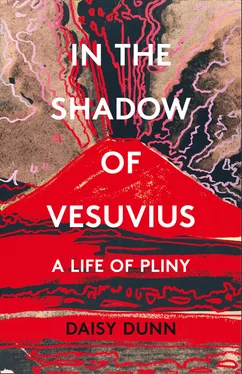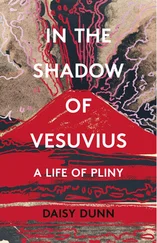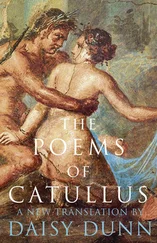Having re-established control over Judaea, Vespasian was determined to put the empire back on an even keel. Increasing – and in some cases doubling – the tribute which the provinces owed Rome, he earned a reputation for cupidity, but went some way towards recovering the financial losses Rome had suffered through Nero’s profligacy. 17Pliny the Elder played an increasingly important role in his administration. In the seventies AD, he was appointed to a series of civil posts or ‘procuratorships’ overseas. Although the details of his employments are unknown, he is said to have ‘conducted very splendid and continuous procuratorships with the utmost integrity’, one of which took him to Tarraconensis, the largest Roman province in Hispania, to oversee the imperial finances. 18
Between his work for the imperial council and his promotion following his procuratorships to the admiralty of the fleet, Pliny the Elder had little time for conducting his own research. He had no more opportunity to pursue his own interests when, in AD 79, Vespasian died at the age of sixty-nine, anticipating his posthumous deification with the words: ‘I think I’m becoming a god.’ 19His successor, Titus, was only too pleased to retain his former tent-mate in the imperial administration. Pliny the Elder had little choice but to persevere with his studies in the rare hours he had to himself. As he explained to the new emperor, he dedicated his days to him, and his nights to producing his encyclopaedia. 20
A furious night-writer, Pliny the Elder was fortunate to possess what his nephew called ‘a sharp intellect, incomparable concentration, and formidable ability to stay awake’. 21There were moments when he nodded off during the day, but these were as nothing to the time other people wasted. If his passion for night-writing was born of necessity, then it was driven by the need he felt to make the most of the time he had. Humans are not wronged by the fact that their lives are brief, he wrote, but do wrong by spending the life they do have asleep. For to sleep is to lose half of one’s allotted time – more than half, given that infancy, ailing old age, indeed the hours lost to insomnia, cannot truly constitute living. 22He went so far as to establish a memorable formula to express these beliefs. Vita vigilia est , he wrote: ‘To be alive is to be awake.’ 23
The idea was a logical solution to a theme found in Homer. If wakefulness was life, then it was because sleep was akin to death. The Homeric epics taught that Sleep and Death were brothers. When Zeus’s mortal son Sarpedon falls at Troy in the Iliad, Sleep and Death carry his body from the battlefield. A painting of them straining beneath the weight of the warrior’s bleeding corpse became the unlikely adornment for a wine bowl in the late sixth century BC. 24The brothers are formidable figures, with richly textured wings, armoured body plates and long dark beards. One grasps Sarpedon’s legs, the other his gigantic shoulders, while blood gushes from his wounds like wine from a ruptured wine skin. Distributing his weight between them, Sleep and Death raise him from the ground as the god Hermes watches. There is life in Sarpedon’s tendons yet, but his head is slumped, the final insult to the divine father who could not save him. To preserve what is left of his dignity, Sleep and Death must carry his body to his native Lycia for burial.
Sleep and Death were united in Pliny the Elder’s mind in the same way as they were on the archaic pot. They were strange and inimitable brothers, shadows of one another, complementing each other in their work. To embrace Sleep as the brother of Death was to recognise wakefulness as the sister of life. It was by doing precisely this that Pliny the Elder was able to complete his encyclopaedia in time to dedicate it to Titus. ‘You are to me such as you were in camp as my tent-mate,’ he wrote to him in the preface. ‘Not even the improvement in your fortunes has changed you, except in so far as you can now bestow as much as you want to.’ 25
Titus was given the opportunity to prove his generosity when, just a few months after he succeeded his father as emperor, Vesuvius erupted. Faced with the cruel task of recovering his empire from ruin, he proved himself to be a man of the utmost pragmatism. Although there was no straightforward way of rebuilding the cities when the foundations were so unstable, Titus hastened to the disaster zone and appointed a pair of senators to plan the restoration of the few salvageable buildings and oversee the construction of new ones. The property of those who had died without issue was harnessed to fund the relief effort. The imperial purse made no profit from the tragedy. 26Titus’ clemency in the wake of the disaster was the kindest tribute he could have paid the learned friend who, after a lifetime of being awake, had finally been carried off in the arms of Sleep and Death.
Pliny the Elder had pushed the boundaries of mortal achievement. His publication of over 20,000 pieces of information exceeded anything his predecessors had produced. His encyclopaedia was an attempt to overcome the frailty of human life and human memory: a record of everything man had learned and risked losing through neglect and the passage of time. It was his most precious legacy, evidence of how much one could do when one’s life was structured in a certain way.
Pliny longed to establish a comparable legacy for himself. ‘Day and night,’ he wrote, as often quoting Virgil, ‘I think “how I too might raise myself from the earth”; for that would fulfil and indeed surpass my prayer “to fly victorious over the lips of men”.’ 27Another man might have been anxious to keep such ambitions to himself, but Pliny felt no shame in front of his friends and relatives. The poet Martial had found him bent over his desk enough times at his home on the Esquiline Hill to issue a warning to others against disturbing him in the middle of the day. In a poem Pliny recorded in his letters, Martial advised his reader:
Don’t you knock on his clever door
Drunk and whenever suits you.
He gives all his days over to gloomy Minerva
While he prepares for the ears of the One Hundred
This speech, which the coming ages can
Liken to the pages of Cicero himself.
Safer to go when the lamps burn low.
This is your hour, when Bacchus is frenzied,
When the rose is triumphant, the hair wet with unguent.
At that hour even a dour Cato would read me. 28
Martial’s teasing poem provided Pliny with further incentive to exchange unguents for ink. For all that Pliny admired his wit – he was ‘original, incisive, and sharp’ – he doubted whether Martial would achieve his own dream of living forever ‘on the lips of men’.
Almost a quarter of a century Pliny’s senior, Martial came from Bilbilis, in the Aragon region of modern Spain, but had established himself as a keen satirist of Rome. He wrote as enthusiastically of everyday life in the city – its dinners, its gossip, its most notorious fiends – as he did of its architecture. His poetry captured the rhythm of the times with an ease and humour that is often absent from Pliny’s letters. Yet Pliny could not help but wonder what interest there would be in the characters Martial skewered in his poems when he was dead and gone. Martial might reasonably have wondered how he fared in Pliny’s estimation and would no doubt have been surprised at his modest hopes for his legacy. Pliny was so outwardly supportive of him that he even paid for him to make a journey home. Perturbed that poets no longer received money or promotion for their praise poetry, as they had in ancient times, Pliny had endeavoured to compensate Martial, if only ‘out of respect for our friendship and the verses which he had composed about me’. It is little thanks to Pliny that Martial remains one of the most popular poets of ancient Rome. 29
Читать дальше












